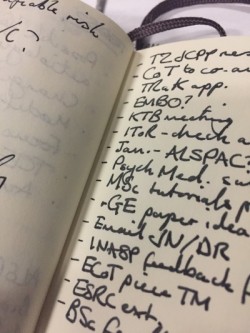Completing a PhD can often seem like a Sisyphean (or perhaps Bush-ian?) task. Of course, there are times when it doesn’t feel that way (ah, March 26th, what a day that was actually…). In general though, we expect stress – and we get it. But surely there’s a better way?
More articles are written about how to think about/cope with/survive doing a PhD than any of us have time to read. Which, in a nutshell, is kind of the problem.
(Although, if you do come by some free time, I’m not sure Googling ‘PhD stress’ is the best way to use it. In fact, if you’ve gotten this far and you are not feeling guilty about not working, I suggest you capitalise and leave me to go out and walk in the park or something. If you are, I guess you can stick with it… or go back to work.)
The reason I felt like adding to the pile (can predominantly online articles be a pile?), is that I needed content for the blog have some recent experience to share. Like most people, I’m always aware of lots of plausible-sounding life-coaching advice knocking around. I’ve read about how to control my Chimp. I’ve listened to ideas for unleashing my creativity. I’ve been told to SUMO. But, also like most people, I’m not great at following advice; especially when it is wrapped in the intellectual-fast-food style packaging of a TED talk or pop science book. Besides, just like fast food, it’s not nutritional value that we’re really interested in with such things, is it?
“All the articles I read about doing a PhD told me I would be stressed.”
But recently, I got a bit stressed. This was unusual for me, as I am fortunate that my default state is to not particularly worry about things. For a while I just accepted that, coming into my final year, this was to be the new status quo. After all, everyone around me is stressed. All the articles I read about doing a PhD told me I would be stressed. Perhaps it’s unavoidable and I’m lucky I’ve lasted this long – this was my line of thinking. Yet, I felt a bit disappointed in myself too. Not getting stressed was, I had felt, one of my few real talents, and something I could use to help others around me. Without that, I was down to just being able to reach things from high supermarket shelves for old ladies – which is fine, but kind of niche.
So, I decided to show some humility and try out a bit of self-help advice. I’d recently heard the benefits of process versus outcome-based thinking extolled in relation to sports coaching, and it struck me as being particularly relevant to PhD-life. The idea is that placing too much emphasis on outcomes (completing an analysis, publishing a paper) when setting yourself targets is a recipe for disappointment and demotivation. After all, we are generally very bad at predicting unforeseen future difficulties (it’s right there in the name). Moreover, if I rely on outcomes such as publications to keep my spirits up, I’m betting my happiness and self-esteem on a whole host of externally-controlled factors that contribute to the realisation of this outcome: timely input from co-authors, wise decisions from editors, fair treatment from reviewers… the list goes on. The solution? To relate your goals to the process you want to undertake, not the outcomes you hope will follow. In doing so, the potential impact of all those nasty external variables is reduced, and your personal control over your progress is retained.
Part of the reason that I like this idea in a PhD context, is that it fits with the idea of the PhD as a period of training. I try to remind myself of this all the time, and reading articles, blogs, and think-pieces on the many problems in modern science only reinforces my desire to use this time to learn how to do things properly. I’ve no doubt that the vast majority of my peers think similarly, as would most supervisors. Given this (assumed) agreement on the benefits of rigorous methodological training, I did start to wonder just why the outcome-thinking should be so prevalent among PhD students in the first place.
One argument is that putting one’s focus on outcomes during the ‘training period’ of the PhD provides ideal preparation for the publish-or-perish world of academic employment into which, like family-life eschewing*, salary-phobic, credibility-avoidant lemmings, we knowingly shuffle. On a practical level, this is undoubtedly true. Publishing papers during your PhD is widely acknowledged to be advantageous in the post-doc job hunt. More pragmatically still, one could argue that early exposure to the relentless need to produce is a good way to ward off those lacking the stomach for the fight.
But science needs a blend of individuals, not just the dogged and the resolute. And those ejected through academia’s post-PhD steam-valve don’t have to be creatives or communicators to be much missed in the field. The postdoctoral rung of the ladder marks the unwelcome milestone where the gender balance first reverses to see men taking the majority of positions (oh; and the money too). Even for those left standing, there are very real conversations to be had about mental health – the irony is not lost on those in our field.
“But science needs a blend of individuals, not just the dogged and the resolute”
Talking to friends with children at school is another reminder that I might be fighting a losing battle here: after all, the process of conditioning us to focus on outcomes starts terrifyingly early. At best, kids are left to puzzle out the contradiction between what the adults around them say to them directly (‘Don’t worry! These tests aren’t really important at all; just try your best’) and literally all the other signals they receive on the subject. At worst, pressure comes from parents and teachers too. The potential problems with this focus on outcomes, in the form of exam grades, throughout childhood have been well documented and explored.
All of this puts me in mind of a well-known team-building activity called the ‘Helium stick’ game. In this game, a long stick or pole is balanced on top of the outstretched fingers of a group people stood face-to-face in two lines. They are given the simple instruction to collectively lower the stick to the ground, ensuring that their fingers remain in with its underside at all times.
Lo and behold, as everyone who has taken part in this activity will know, as soon as the start signal is given, the stick invariably and infuriatingly begins to rise towards the ceiling. Of course, this activity is designed to show what can happen when individual and collective objectives are pitted against one another.
And so it is in academia; whether, I think, at the student level or above. Our collective interest may be in improving the system, reducing the stress, focussing on the process; but the urge to pursue opportunities to get ahead – or even stay in touch – is a hard one to resist.
“The feeling of “but if I can just finish X, I’ll be back on top of things” is a powerful one”
So what of my decision to try living more ‘process-fully’? Well, after a week of surprisingly Zen-like calm, in which I actually completed some sessions of a Coursera course I’d previously signed up to but never started, did some of the ‘wider reading’ that I’d previously ear-marked but never touched, and watched on unconcerned as unexpected delays afflicted my projects, I cracked. The feeling of “but if I can just finish X, I’ll be back on top of things” is a powerful one, and I was soon back to making outcome-laden to-do lists that look like a series of bad Scrabble hands:
I’d like to help get this particular stick to the ground, but it seems there’s no way I’m going to risk losing contact in the meantime.
*But not necessarily! Our lab director Thalia’s recent piece containing tips on maintaining this precarious balance is well worth a read on this subject.



